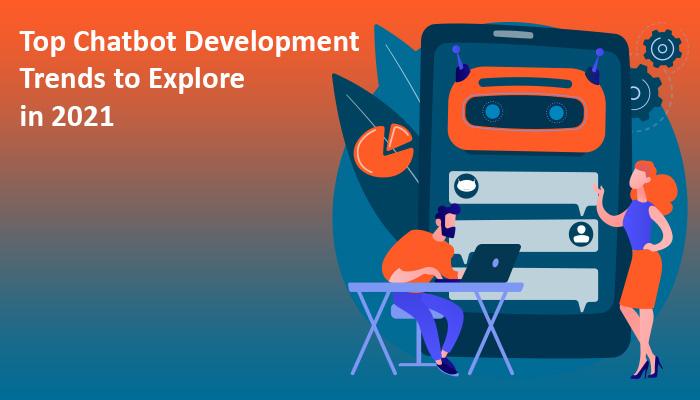Introduction
“Chatbots are the future! Check out the latest chatbot development trends.”
“Chatbots are all set to change the digital landscape.”
“Make chatbots a part of an omni-channel marketing strategy to fuel the growth of your business.”
You might have come across these statements from colleagues, online articles, or experts in the industry.
But what does the research say about the benefits of chatbots for business? Will AI-powered technologies and chatbots be the future?
Here’s your answer. Keep reading to discover
- More about chatbots
- How chatbots benefit businesses
- Overall predictions on chatbot usage and growth of the industry
- Latest Chatbot Development Trends across various industries and some interesting statistics.
- The future of the chatbots industry
What are Chatbots?
Chatbots are applications that are designed to have a conversation with the visitors of your website. Businesses initially used them to save money in businesses with a large volume of customer service interactions.
But now, chatbots are integrated into websites, mobile applications, social media, and emails to resolve customer queries and collect helpful consumer insights.
And these insights will help businesses learn consumer preferences and create hyper-personalised experiences for them.
With continuous development of the chatbots’ natural language processing capabilities, they’ll conduct 50% of interactions without any need for human intervention by 2024.
What are the benefits of using a chatbot?
Here’s how chatbots benefit businesses today.
Saves time and resources
Most of the queries in customer service are basic and repetitive. For example, opening a bank account is a standard process.
If 100 people ask the same question, one chatbot can answer all of them at the same time without costing customers, resources, and time.
Meanwhile, other customer service personnel can spend time helping customers with more complex queries.
Saves money
Juniper Research has found that chatbots will save $7.3 billion and 862 million person-hours for banks by 2023.
Not subject to human limitations
Chatbots don’t get tired or lose their temper as humans do. They can be programmed to give accurate responses 24 x7 without any loss in performance.
Now, let’s look at an overview of the chatbot development trend across all the industries before we dive into specific ones.
Chatbot Development Trends in 2021: A Holistic View
The chatbot industry is expected to grow across all industry verticals in the upcoming years.
A Business Insider report says that the chatbot industry is projected to reach a whopping $9.4 billion in 2024 from $2.6 billion in 2018.
Some factors that are contributing to the overall growth of the industry include:
- Chatbots are reducing costs in the customer service sector.
- They cost less to develop and deploy.
- Consumers prefer chatbots when they need instant answers to questions.
- The demand for conversational AI-based customer support services is increasing at a rapid rate.
- The growth of Natural Language Understanding (NLU) technologies will make chatbots more adept at providing accurate responses to consumers’ complex queries.
Chatbot Development Trends across various Industries
Would you like to know how chatbots will disrupt your industry? This section explains how chatbot technology will evolve to help save time, money, and resources for various sectors.
Banking
Previously, banks viewed chatbots as a simple digital tool that helped resolve simple queries for customers.
Research has stated that it can save banks 4 minutes per inquiry. That roughly translates to savings between $0.5- $0.7 a minute.
Now, banks are utilising chatbots as digital assistants to help customers with personal finance and scheduling appointments with the bank.
For example, Bank of America’s chatbot, Erica, helps 1 million customers view their transactions, check their weekly spend summary, transfer money, schedule bank appointments, and check credit scores.
Soon, Erica will assist its users in making better financial decisions and help users save more money.
The rest of the banking chatbots will follow a similar path in the future. They’ll help us in complex and time-consuming procedures like loan approvals.
Banking chatbots will also verify your documents in no time through Automatic Image and Document Processing (ADP) technologies. So, you’ll no longer have long wait times and queues.
There’s also a growing demand for voice assistants. So, chatbots will be able to take voice inputs from you and talk to you on the phone to help you make sound financial decisions.
Healthcare
The demand for chatbots in the healthcare industry has skyrocketed because of hospitals’ large patient wait times and limited ability to counsel patients.
Chatbots can also be used to reduce the number of people who don’t show up for important procedures like colonoscopy.
It will keep in touch with the patients and clear up myths via text and email conversations to increase the number of people who show up for the procedure.
In the future, chatbots will record patient symptoms and suggest the best course of action for simple ailments. It will book an appointment on the patient’s behalf and transfer cases to a real-time doctor if it cannot resolve your issue.
According to a Meticulous research report, the chatbot market in healthcare is expected to reach $703.2 million in 2026 with rapid developments in technology.
E-commerce
E-commerce is exploding, especially with the global pandemic situation. One of the biggest challenges that e-commerce companies are facing is customer attrition.
In other words, e-commerce businesses want to lower the number of customers who have stopped shopping with them.
A blog post by BigCommerce gives insights into the problems with online shopping experiences faced by consumers.
A majority of the shoppers said it was hard to navigate the site and find answers to simple questions. Moreover, they had issues finding basic details about the business and felt that it took a long time to find services.
Chatbots are stepping in to solve the problem and helping users find what they’re looking for on the website. They’re recommending new items to customers, answering FAQs instantly, and resolving simple issues.
Chatbots will be able to detect the emotional states of consumers and provide more accurate responses in the future. It will also be able to respond to voice commands and enhance the user’s shopping experience.
How are Chatbots going to evolve across other industries in the future?
The chatbot industry will grow by leaps and bounds with all the technological progress we’re making. Most businesses will deploy chatbots to make their sales and service process more efficient, regardless of the size of the industry or the niche they belong to.
Here are some of the advancements we can expect chatbots to make in the coming years.
Chatbots will become more human
With great strides in Natural Language Processing (NLP), chatbots will understand requests and their intent to give users an accurate response.
They’ll also understand accents better if they’re voice-enabled and provide better experiences for users.
Chatbots will improve Customer Experience (CX)
- 67% of the consumers will pay for great customer experiences.
- Companies can boost their revenue by 20%-30% by ensuring an excellent consumer experience.
Mckinsey’s detailed blog post on customer experiences sheds light on its importance for businesses.
So, how can chatbots help in enhancing consumer experiences in the future?
Chatbots will be able to conduct a sentiment analysis of conversations with customers to detect their moods. Unhappy customers will be put in touch with the service team, who can then smooth out the issues.
Chatbots will help in payment automation
87% of the world’s population use some messaging platform. Conversational commerce or C-Commerce has helped connect businesses and customers via text.
C-Commerce isn’t limited to only millennials, as baby boomers too find the process of buying items through a chat intuitive and simple.
About 67% of consumers engaging in C-commerce told Facebook that they’d continue spending more through chats.
So, chatbots should evolve to enable users to pay directly through Messenger or other messaging platforms. This will help businesses automate their sales process and collect payments from Messenger itself.
Chatbots will become voice-enabled
More than 50% of the searches in 2021 will be voice-driven, according to Forbes. So, voice bots will also become a common occurrence in the future.
Businesses can use this new development to collect data in real-time and provide personalized experiences for consumers.
Companies will use chatbots for internal processes.
Businesses can also streamline workflows internally and save lots of time on tedious processes like employee onboarding and responding to employee queries.
Chatbots will help businesses initiate the screening of candidates by asking them questions and recording their answers.
Once the employee is onboarded, the chatbot takes the new hires through the company policies and answers related questions.
Wrapping Up
Chatbots have evolved from performing monotonous tasks to being used as assistants. They save time, money, and resources across various industries.
The chatbot industry is expected to grow steadily with advancements in Natural Language Processing (NLP) techniques.
Chatbots are already helping us make better financial decisions, book appointments, and answer our queries instantly.
In the future, chatbots will respond to voice commands, gauge our emotions, automate our payments, and onboard us to our dream company.
The future with chatbots looks bright, doesn’t it?
Author Name:- Harikrishna Kundariya
 Biography:- Harikrishna Kundariya, a marketer, developer, IoT, ChatBot & Blockchain savvy, designer, co-founder, Director of eSparkBiz Technologies. His 8+ experience enables him to provide digital solutions to new start-ups based on IoT and ChatBot.
Biography:- Harikrishna Kundariya, a marketer, developer, IoT, ChatBot & Blockchain savvy, designer, co-founder, Director of eSparkBiz Technologies. His 8+ experience enables him to provide digital solutions to new start-ups based on IoT and ChatBot.




















![TamilMV Proxy List Top 30+ [Unblock TamilMV Sites] TamilMV Proxy Unblock](https://technewsgather.com/wp-content/uploads/2023/04/17825836_SL-121019-25870-14-1-100x70.jpg)